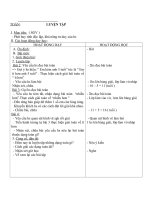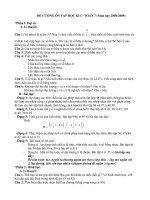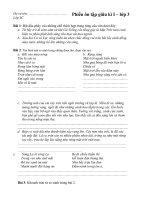Phiếu luyện tập reading 7 HK I
Bạn đang xem bản rút gọn của tài liệu. Xem và tải ngay bản đầy đủ của tài liệu tại đây (74.39 KB, 3 trang )
II. Reading
Reading 1:
Fill in the blank with one word or group of words from the box
Jerry looks for (1) ____________. (2)___________.finds a bowl of ____________near (3) ____________. He decides to
take (4) ____________ and eat it.
He is (5) ____________ now. He feels (6) ____________. The cat is (7) ____________. He doesn’t (8) ____________
anything. Then, he wakes up. He finds that his bowl doesn’t have (9) ____________milk.
He is so (10) ____________. He chases the mouse.
Reading 2:
Every year students in many countries learn English. Some of these students are young children. Others are
teenagers. Many are workers, doctors or engineers.
For some people, learning English is not easy. Some people learn at school, others study by themselves. A few
learn English by hearing the language in films or on television. Most people must work hard to learn another language.
Many boys and girls learn English at school because it’s one of their subjects. Many people learn English because
it’s useful for their work. Other people learn English because they want to read newspapers and magazines in English.
I. Complete the sentences
1. For some people, learning English is not.........................
A difficult b. good c. useful d. easy
2. Many boys and girls learn English at.........................because it’s one of their subjects.
A Evening class b school c English club d at home
3. Many people learn English because it’s.......................for their work.
A useful b helpful c essential d needed
4. Other people learn English because they want to read...................and magazines in English.
A comic b. novels c folktale d. newspapers
II. True or False? Put T or F in the box
1. Only students learn English every year.
2. Some people learn at school, others study by themselves.
3. Many people learn English by hearing the language in films or on television.
4. Most people must work hard to learn a mother language.
Reading 3:
IV. Fill in each blank with one suitable word from the box to complete the following conversation.
Usually teach English never start
Sometimes Drive teacher school classes
A. Mr. Bean, what do you do?
B. I’m a ………….. (1).
A. What do you teach?
B. I teach ………… (2).
A. Where do you work?
B. I work at a language ………… (3) in London.
A. Do you usually walk to work?
B. No, I always ……….. (4).
A. What time do you usually ……….. (5) work?
B. I …………. (6) start work at 9.00 a.m.
A. How many classes do you teach?
B. I usually teach three ………… (7) a day.
A. Do you ever teach evening classes?
B. No …………. (8). I only ………… (9) in the day.
A. Do you ever teach on Saturday?
B. Yes, but only …………. (10).
Reading 4:
A SOCCER MATCH
Soccer is one of the world’s most popular sports. A soccer match consists of two teams, with 11 players on each side.
When the referee blows his whistle, the game begins. The best thing in the game is to score is to score goals against the
other team. A goal is scored by putting the ball in the other team’s net, either with players’ foot or head. Each match lasts
for 90 minutes. There is a half - time break after 45 minutes. The team that scores the most goals by the end of the match
is the winner. The goalkeeper stands between the goalposts and tries to stop people scoring goals. All the players must
not touch the ball with their hands except the goalkeeper.
something to eat full happy He sleeping know
angry afraid drinks the cat eat any
it milk the cat
1. How many players are there in a soccer match”
A.11 B.20 C.22 D. 24
2. How long does a match last?
A. An hour. B. An hour and a half. C. A quarter of an hours.D. Three quarters of an hours.
3. How is a goal scored?
A. By putting player’s foot in the other team’s net. B. By putting players’ head in the other team’s net.
C. By putting players’ hand in the other team’s net. D. Putting the ball in the other team's net, either with players'
foot or head.
4. What does the goalkeeper do?
A. He has to stand between the goalposts. B. He uses his hands to score goals.
C. He tries to stop people scoring goals. D. He blows his whistle.
5. Who can touch the ball with hands?
A. Players. B. Goalkeeper. C. Referee. D. None of them.
Reading 5:
Complete the text with the words in the box then answer the questions below
large tub apartment rooms everything not bathroom comfortable really
Minh lives in a lovely (1) ....................... in Ho Chi Minh city. His apartment is (2) ................ very big but it is
very (3) ..................... . There are five (4) ..................... in the apartment: a living room, two bedrooms, a
kitchen and a bathroom. The (5) ..................... is very beautiful. It has a sink, a (6) ..................... and a shower.
The kitchen is very modern. There are (7) ..................... in the kitchen: refrigerator, washing machine,
dishwasher, gas cooker, electric stove, kitchen table, ... . Minh’s bedroom isn’t (8) ................. but it is very
bright. There is a wonderful view from his bedroom. Minh (9) ................... likes his apartment very much.
1, Where does Minh live?
……………………………………………………………………………………
2, How many rooms are there in his apartment?
……………………………………………………………………………………
3, What are there in the bathroom?
……………………………………………………………………………………
4, Is there a gas cooker in the kitchen?
……………………………………………………………………………………
5, How is Minh’s bedroom?
……………………………………………………………………………………
6, Does Minh like his apartment?
……………………………………………………………………………………
Reading 6:
Read the passage, then answer the questions:
Vietnamese students take part in different after school activities. Some students play sports. They often play
soccer, table tennis or badminton. Sometimes they go swimming in the swimming pools. Some students like
music, drama and movies. They often practice playing musical instruments in the school music room. They
join the school theater group and usually rehearse plays. Some are members of the stamp collector’s club.
They often get together and talk about their stamps. A few students stay at home and play video games or
computer games. Most of them enjoy their activities after school hours.
1, Which sports do some students often play?
....................................................................................................................................
2, How often do they go swimming?
....................................................................................................................................
3, Where do some students often practice playing musical instruments?
....................................................................................................................................
4, How often do they rehearse plays?
....................................................................................................................................
5, What do the members of the stamp collector’s club often do?
....................................................................................................................................
6, Do Vietnamese students enjoy their activities after school hours?
....................................................................................................................................









